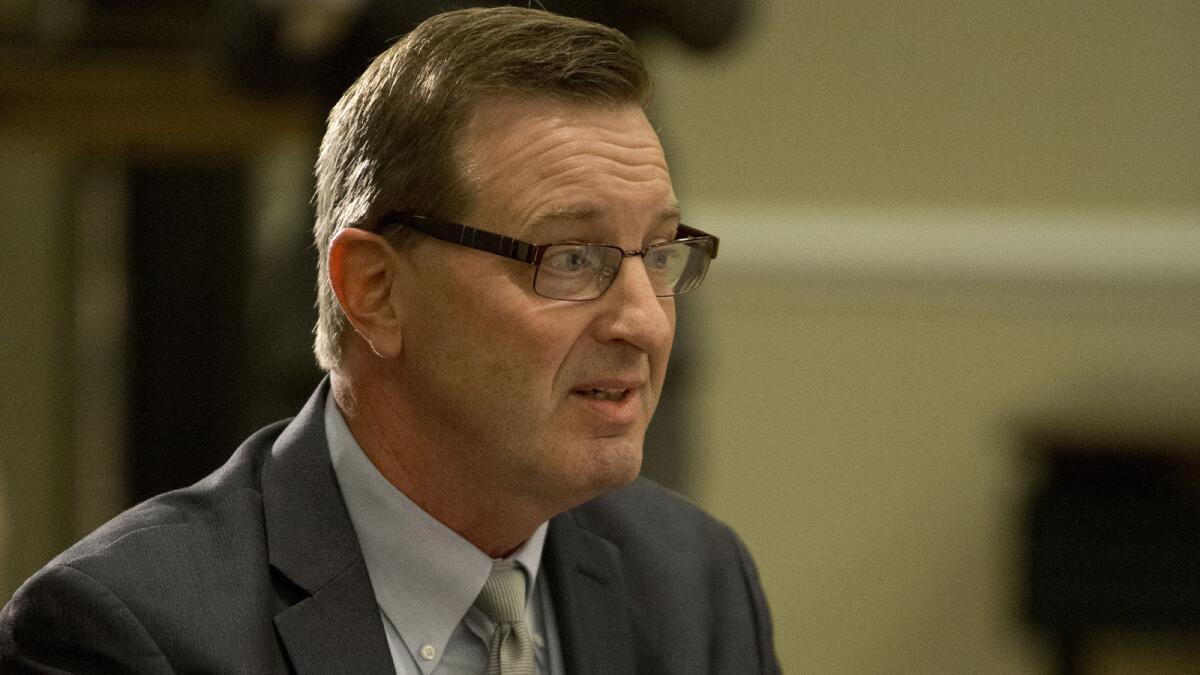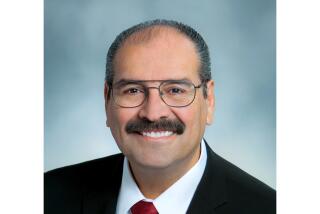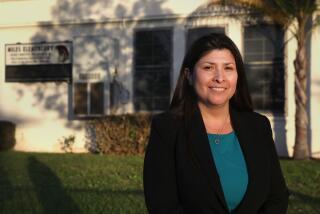L.A. Unified food chief resigns under fire but maintains innocence

David Binkle at a meeting on school nutrition last year in Washington.
David Binkle, L.A. Unified’s food services director who won national acclaim for improving school meals, has resigned following a recent audit that found massive waste, ethical breaches and financial mismanagement under his watch.
Binkle said he retired from the district and will receive a pension; L.A. Unified said he resigned.
Binkle said Monday that he was innocent of all charges that he had mishandled the district’s now-defunct marketing program to promote healthful food. He denied engaging in conflicts of interest in connection with his private consulting firm and vendor-paid travel to school food conferences. He said all of his actions were legal, specified in the vendor contracts and approved by senior district officials, including Chief Deputy Supt. Michelle King.
Binkle, 53, was removed from his position in December and ordered to stay home during the investigation while continuing to draw his $152,000 annual salary.
“The facts show I did nothing wrong,” Binkle said. “But it’s time to move on to pursue other opportunities. It’s a bad feeling to collect taxpayers’ money when you’re not doing any work.”
Binkle said he has not decided whether to sue the district for libel, slander and defamation, but that “all options remain open.”
A professional chef who joined the district in 2008, Binkle helped adopt cutting-edge menus lower in sodium and fat, introduced breakfast and supper programs, increased meals served by 76,000 daily and promoted directives for more healthful school food from the federal government and the L.A. Board of Education. The various efforts were praised by First Lady Michelle Obama and featured in Tedx Talks.
Binkle also won many supporters among the district’s cafeteria managers, who said he improved their working conditions and took the time to visit their campuses to hear their suggestions and concerns directly.
L.A. Unified’s office of the inspector general issued a 33-page audit last month that found numerous problems in a new food procurement system introduced five years ago to supply the nation’s second-largest school meal operation.
Under the system, eight major vendors agreed to contribute more than $1.5 million in marketing funds for healthy food initiatives and student nutrition as part of their bids for the $750-million, five-year food contracts.
Auditors found inadequate controls over those marketing funds and questioned some of the payments: $117,500 to philanthropist Meg Chernin’s Los Angeles Fund for Public Education; $65,000 to place Los Angeles Dodgers photos on school milk cartons; $6,800 for employee travel and conferences;$581,000 to two L.A. public relations firms, RL Public Relations and Tatum Wan Co., among others.
Auditors also found higher food prices, bloated inventories, incompatible computer systems to order food and a “haphazard” meal development process. In addition, the audit found increased meal participation and greater innovation and flexibility.
In a statement last month, L.A. schools Supt. Ramon Cortines said the district took the audit findings “very seriously” and has already moved to tighten fiscal controls and spending oversight. The district also axed the marketing program, which was started by then-food services director Dennis Barrett, who now works for the New York City Department of Education.
The marketing program has been criticized by Board of Education President Steve Zimmer for focusing too much on splashy advertising initiatives rather than grass-roots community events. He also said vendors should not pay for district marketing. He could not be reached for comment Monday.
Binkle has denied conflict-of-interest charges in connection with his private company. He said state law doesn’t require disclosure of outside income from his California Culinary Consulting firm because it was not earned in the same jurisdiction as the district. The firm’s annual revenue last year was $19,000 - not $950,000 as listed in the audit, he said.
He also has said that vendor-paid travel to school food conferences for himself and other district officials was included in contractual agreements and approved by his superiors.
L.A. Unified’s $354-million food program serves more than 130 million meals annually.
Twitter: @TeresaWatanabe
ALSO
Some college students on financial aid don’t get it in time to pay fees
‘Giving circles’ plant seeds of philanthropy in Asian American communities
Paid $1 to $3 a day, unauthorized immigrants keep family detention centers running
More to Read
Start your day right
Sign up for Essential California for news, features and recommendations from the L.A. Times and beyond in your inbox six days a week.
You may occasionally receive promotional content from the Los Angeles Times.







